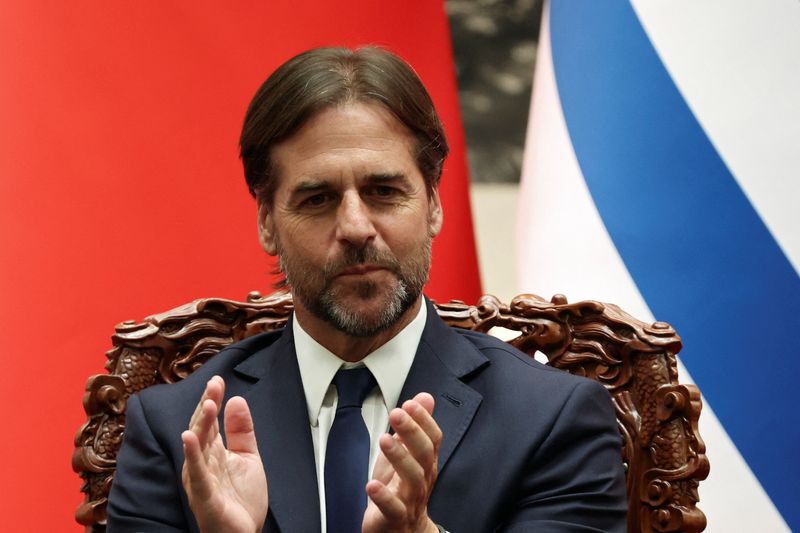By Joe Cash
BEIJING (Reuters) -Uruguayan President Luis Lacalle Pou and Chinese Premier Li Qiang are keen to keep working on a bilateral free trade agreement as well as pursue one between China and the wider Mercosur trade bloc, according to a joint statement.
The statement follows a Thursday meeting in Beijing between the two and comes after China and Uruguay this week upgraded their bilateral relationship to a "comprehensive strategic partnership," elevating Montevideo's ties with Beijing to those of Argentina and Brazil.
Beijing is seen as particularly interested in an FTA with Mercosur as that could put pressure on Paraguay, the last remaining South American country with ties to Taipei, to rethink its links with Taiwan which China considers part of its territory.
The statement said that Uruaguay and China were committed to pursuing a bilateral FTA and noted that a joint feasibility study had been completed.
"At the same time, the two sides are willing to promote China-Mercosur FTA talks," it added.
Lacalle Pou first proposed a bilateral FTA with China in 2021 to secure similar opportunities for its exporters as those enjoyed by Chile, Costa Rica, Ecuador and Peru - countries which have secured tariff-free access to the world's second-largest economy.
"Uruguay is firmly committed to close relations with China and active participation in the Belt and Road Initiative (BRI)," Lacalle Pou said, according to a readout of the meeting in Chinese state media.
Uruguay was also "willing to... accelerate establishing an FTA between Uruguay, Mercosur and China," Chinese media quoted him as saying.
But Uruguay faces stiff opposition from fellow Mercosur members Argentina, Brazil and Paraguay who want their bloc to settle an FTA with Europe instead.
Last November, they warned they could take "measures" against Uruguay if it forged ahead with its plans to unilaterally negotiate an FTA with China.
Uruguay has also applied to join a major trans-Pacific free trade pact that China also aspires to join, but both Montevideo and Beijing must overcome significant political hurdles before that is possible.
Li was quoted as saying that China and Uruguay should take the signing of Belt and Road Initiative cooperation documents as an opportunity to promote a continuing increase in bilateral trade.
China accounted for 27% of Uruguay's exports in 2022, United Nations Comtrade data shows.
At present, Uruguayan beef, which constituted two-thirds of those exports to China, is subject to a 12% tariff.
By comparison, other major beef exporters Australia and New Zealand, which have FTAs with China, pay tariffs at 3.3% and 0%.

Uruguay came close to signing an FTA with the United States in 2006, but its government at the time eventually rejected the deal over fears of expulsion from Mercosur if it did so.
According to a study conducted by the National Meat Institute of Uruguay in 2021, if China signs an FTA with Uruguay, the meat industry can implement a 0% preferential tariff, which will reduce tariffs by $150 million.